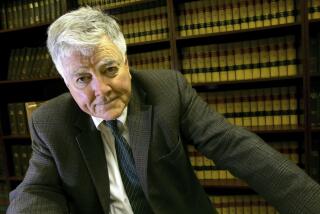GOP Hails ‘Rehabilitated’ Nixon as Geopolitical Guru
- Share via
WASHINGTON — Former President Richard M. Nixon returned Thursday for his first high-profile visit to Capitol Hill since he resigned in disgrace and under threat of impeachment in 1974.
In appearances before friendly Republican audiences and in talks with reporters, Nixon still showed traces of his old partisan fire as he played the role of elder statesman on global policy.
Jumping into a current controversy, he described a proposal by House Democratic leader Richard A. Gephardt (D-Mo.) to aid the Soviet Union as “stupid” unless there is a negotiated cut-off of Soviet assistance to Cuba and other hard-line Communist nations.
GOP leaders gave rave notices to Nixon’s analysis of recent global political changes.
“He’s the world’s paramount foreign policy intellectual,” said Rep. David Dreier (R-La Verne).
House GOP Whip Newt Gingrich exulted: “It was almost eerie to hear a man who is a living example of history.”
As the twice successful presidential candidate exchanged handshakes with dozens of students, clerks, Capitol police officers and Senate pages, Senate Republican leader Bob Dole of Kansas impishly told reporters: “I think he’s going to announce.”
Nixon met in a closed session in Dole’s office with about a dozen GOP senators facing reelection this year and two members of the House trying to win Senate seats.
When asked if Nixon were now politically rehabilitated, Dole replied: “I think he is. That’s my opinion. Others may disagree.”
Secretary of State James A. Baker III, who sat in on the senators’ session with the ex-President, agreed with Dole’s appraisal.
Dole did not always have the high regard for Nixon that he showed Thursday. When asked during the height of the Watergate crisis if he would like then-President Nixon to campaign for him in Kansas, Dole quipped: “A flyover would be sufficient.”
Certainly, the ex-President seemed more mellow and far more relaxed than during the many months of the Watergate scandal, which led to his becoming the first President in U.S. history to resign from office.
The same Nixon who once scorned the press actually bantered with a horde of reporters.
When a tongue-tied reporter mistakenly addressed him as “Mr. Gorbachev,” Nixon quipped: “I’ve been called worse.” Mikhail S. Gorbachev is president of the Soviet Union.
His step was slower, his shoulders bent, and his once-familiar black eyebrows are now turned a light gray, matching the streaks in his hair. Although his voice seemed weak at times, the 77-year-old Nixon was quick-witted and showed a fine grasp of detail.
In the course of his hourlong talk, sources said, the ex-President asserted that Cuban President Fidel Castro’s “days are numbered” and declared that “Poland must not fail” in its attempt to switch its state-controlled economy to a free market approach.
“Time is running out for Iran,” Nixon added. “The economy is a disaster area, and they can’t count on aid from Eastern Europe any more.”
Nixon censured Republicans for voting recently to override President Bush’s veto of a bill to allow Chinese students to remain in this country for four years. An overwhelming majority of House Republicans voted against the veto imposed by Bush, who wanted to avoid angering the Chinese government. The veto was upheld by the Senate.
“Long term, a constructive relationship with China is in our interest,” Nixon said. “Do you think the Soviet Union is going to export democracy to China? Anyone who thinks Japan is going to export democracy to China is smoking pot.”
In a more nostalgic mood, he recalled how he and John F. Kennedy had cast their first votes in the House of Representatives to support President Harry S. Truman’s plan for military aid to Greece and Turkey in 1947.
“The challenge then was to defeat communism,” he was quoted as telling a group of House Republicans. “The challenge now is victory for freedom.”
Nixon’s visit did not bring him close to the hearing room of the House Judiciary Committee where three impeachment counts were approved in late July, 1974, triggering his resignation less than two weeks later. But those times of trouble were clearly on his mind, according to some Republicans.
Dreier, for example, said Nixon alluded to those days when he told House Republicans: “Defeat is an orphan and victory has many fathers, and I certainly know about that.”
Rep. Carlos J. Moorhead (R-Glendale), who voted against impeachment and was one of Nixon’s staunchest defenders on the Judiciary panel, said the former President clearly had this in mind when he told Moorhead in a private conversation: “By the way, thanks.”
Later, meeting with reporters a second time after visiting Dreier’s office in the same House building where he began his career in Washington in 1947, Nixon said his wife, Pat, had recovered from a stroke but now was suffering from emphysema.
“She looks the same as she always did. She has that kind of beauty that lasts forever,” he said.
Although he was clearly emotionally moved by the return to his former haunts in the House and Senate, the President refused to answer a reporter’s question about whether he was now at peace with himself. When pressed on whether he felt his place in history was assured, Nixon put on his most serious air.
“I don’t think I’ll comment on that,” he said, solemnly. “I think my place in history has to be determined by other people. Nobody can really appraise his own place.”
More to Read
Get the L.A. Times Politics newsletter
Deeply reported insights into legislation, politics and policy from Sacramento, Washington and beyond. In your inbox twice per week.
You may occasionally receive promotional content from the Los Angeles Times.










